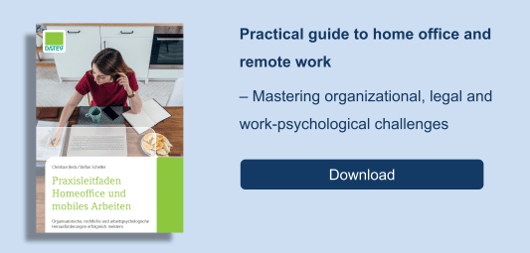Labor market 5.0: "Give up control, retain leadership"

Mr. Scheller, together with attorney Christian Beck, you wrote a Practical guide to home office and remote work. Do you think remote working would have become as prevalent in Germany as it is today, even without the pandemic?
Stefan Scheller: As only a small single-digit percentage of employees had the opportunity to regularly work remotely, for example in a home office, before the Corona pandemic, the crisis certainly acted like an accelerator. However, we should not forget that even today most people work in professions, where home office is either impossible (e.g., in medical professions or in nursing) or undesirable due to other factors. We should therefore never take remote work for granted. Making use of the professional mobility in terms of work location and working hours is more of a privilege than a standard feature. We should not lose sight of this in all discussions.
In January 2021, the proportion of remote workers had increased from 4 percent to almost a quarter of the workforce compared to the previous year. So, leadership is also increasingly shifting to digital. What pitfalls do managers need to be aware of when leading digitally?
Even if, in the best case, there is already around 1.5 years of experience with virtual leadership or leadership at a distance, most organizations are still a long way from a new virtual or even hybrid normality. Leaders may have literally just "muddled through" in recent months or based their behavior on reasons such as "the situation is not easy for any of us". Leadership at a distance, however, requires confidence when guiding teams along the fine line between proximity and encouragement through systematic accessibility on one hand and the extensive empowerment of personal responsibility and the bestowal of trust on the other hand. The biggest pitfall, in my opinion, is the mindset of managers. With the desire for (continued) command and control, leadership at a distance tends to become a nightmare for everyone involved. Instead, I recommend the slogan "give up control, retain leadership". It is no disgrace if even experienced managers recognize that the leadership habits they have learned and cultivated may no longer be appropriate and seek professional support. In fact, this would be absolutely desirable, because a new leadership culture could develop on this basis.
What challenges and opportunities does digital leadership create?
It really starts with a solid basic knowledge of mobile and hybrid working. What happens to work and rest hours? What is the expectation regarding non-accessibility? What technical prerequisites must be in place - also with a view to data protection? How can existing processes be adapted or re-thought for the digital world? Or the question of additional challenges arises in the area of care and how these can be met. My short list is by no means exhaustive. However, it shows very well that basic working knowledge is necessary to be successful in a working world with virtual or hybrid collaboration. This was also why we decided to produce a practical handbook. On the opportunity side, I see starting points for getting a lot closer to what is commonly understood by "new work". But a word of caution: working at the kitchen table at home because of Corona is far from being “new work”! I see a promising path ahead to create sustainable “new work” if we consider the following topics: self-responsibility, self-organization, stronger networking, more participation due to the disappearance of commuting or travel times, reassessing purpose, and a redefinition of "enjoying work".
Challenge or opportunity – which do you think outweighs the other and why?
That is probably more a question of time. Initially, the challenges are likely to outweigh the benefits. After all, most companies lack valid experience in this area – Corona came abruptly and generally caught organizations quite unprepared. However, the further along we are on this learning journey, the more clearly the opportunities will become visible and, above all, tangible. The greatest danger, as I see it, is to give up too quickly – on the Hype Cycle, one would speak of the "valley of tears" – and to throw the pandemic experience overboard. Of course, on-site collaboration may be the better use case for some companies. But mobile work and hybrid collaboration are neither good nor bad, per se. They're just more appropriate for a work situation, or less appropriate. As always, decisions must be made with a sense of proportion and the courage to engage in organizational experimentation must be cultivated.
What conditions are important for effective remote work?
The first thing that would probably come to mind here is the technically and spatially appropriate conditions. But it also requires clear legal arrangements, rules (for example, new operating agreements for companies with employee board-level representation), knowledge of data protection requirements, and much more. This requires a clear commitment to remote work within the company and individuals that will drive the topic. Although HR will often be called upon here, I still consider cross-departmental and cross-functional collaboration to be important.
A major topic in this context is also the mental health of employees. What measures do you consider to be particularly important for establishing and maintaining the mental health of the workforce in the home office?
This is another topic we address in our practical guide. The more digital remote work becomes, the more HR managers must pay attention to the people behind the devices. Managers and HR departments would do well to keep in mind that colleagues who sometimes appear to be nothing more than "two-dimensional heaps of pixels in a square" are also under massive pressure due to remote collaboration. Employees do not all recognize and use the advantages of digitization in the same manner. Also because digital workflows per se are significantly more strenuous and demanding in the long run. In any case, organizations should have concepts in the areas of exercise, nutrition, ergonomics, mental health and stress prevention, and clearly counter the threat of work and private life becoming blurred. They should embrace the advantages of digital collaboration (and not develop hostility towards it) while keeping the disadvantages to a minimum as best as possible. This brings us back to a hybrid way of working, in which collaboration is not limited to "remote only".
During Corona, many managers were not given a choice but were forced to lead their teams virtually. After the pandemic, managers will have the freedom to shape the work in their teams themselves. What do you think leadership will look like in post-Corona times?
Leadership is always context related. If, for example, companies want to move towards "remote only", the ability to lead at a distance is essential. If – as is likely to be the case in many companies – the trend is back to on-site collaboration with the option of occasional remote work, the requirements are weighted differently. Mixed situations in which team members work simultaneously on-site and remotely are likely to be particularly challenging. In my view, hybrid working is also the most difficult situation, because there are few precedents. Managers should therefore undergo intense self-reflection, recognize where they stand on the subject today (mindset, experience level, etc.), and then design virtual leadership for their specific context as people-oriented and as professionally as possible.

About Stefan Scheller:
Stefan Scheller is founder of persoblogger.de, one of the most renowned German-language online portals for HR practice. The platform offers up-to-date HR information, studies and infographics for download, an event calendar and a job portal free of charge and without registration. Stefan Scheller is an HR manager responsible for employer communications at DATEV eG in Nuremberg. 